Finance Minister Nirmala Sitharaman said on Friday the ultimate goal of the tax department is to make life easier for honest taxpayers, but hinted that dishonest taxpayers would face the music. “Don’t give comfort to the dishonest taxpayer in any way. … economic growth and prosperity will surely follow,” she said, while inaugurating the new Central GST (CGST) building in Ghaziabad.
Prompt disciplinary action would be taken against erring Central GST officials to maintain public trust, she said. “If there are people who are bad sheep among taxpayers, follow the protocol to get hold of them. But don’t look at everybody with suspicion,” she said. “Galat kiya hai toh khair nahi, sahi kiya hai toh koi bair nahi (If you do wrong, you won’t be forgiven, if you are right, there would be no ill feeling against you),” Sitharaman said.
With continued reforms, dedication, and teamwork, India will reach new heights in revenue, compliance, and service delivery, the minister said. The “next generation GST reforms” will make the tax system even more efficient, equitable, and growth- oriented, she stressed.
“Keep up the good work, maintain the momentum of reforms, and always remember that our ultimate goal is to make life easier for the honest taxpayer,” the minister told the officers.
Citing a Confederation of All India Traders (CAIT study, she said festive retail sales hit an all-time high of Rs 6.05 lakh crore, an annual increase of 25%. Of the total, about Rs 5.4 lakh crore was spent on goods and Rs 65,000 crore on services, making it the biggest Diwali business in India’s trading history, she said.
She said the Central Board of Indirect Taxes and Customs (CBIC) and CGST Field formations should not lose sight of the essence of the next-generation reforms and maintain the momentum of reforms.
“Field units must conduct an internal audit of the functioning of the GST Seva Kendras and take action on the shortcomings faced by the taxpayers,” she said.
She stressed the need to clear the perception that there’s a level of indifference or protectionism which prevails among officers that weakens the moral authority of the institution. “It sends a clear message that misconduct, dereliction of duty, or unethical behaviour will not be tolerated,” she said.
Asking field officers to use technology for faster registration approvals and grievance redressal, Sitharaman also tasked them to “proactively” undertake trade facilitation measures.
From November 1, 2025, the simplified GST registration scheme will grant automatic registration within 3 working days in two cases: applicants whom the system identifies based on data analysis, and those who self-assess that their output tax liability will not exceed Rs 2.5 lakh per month.
“This single reform is expected to benefit 96% of new applicants. Task of the field formation is to operationalise it without friction,” Sitharaman said.
She also said that GST Seva Kendra across India should be well-staffed, accessible and properly maintained, so that taxpayers receive timely and quality assistance.
The GST Council approved the proposals to cut rates for about 380 items in its 56th meeting in early September, and the changes took effect from September 22 (Navaratri) to benefit consumers ahead of the festive season.
The GST rate structure was simplified from four-slabs one (5%, 12%, 18%, 28%) to two slabs (5% and 18%), with a special 40% reserved for a handful of ultra-luxury/sin goods.

